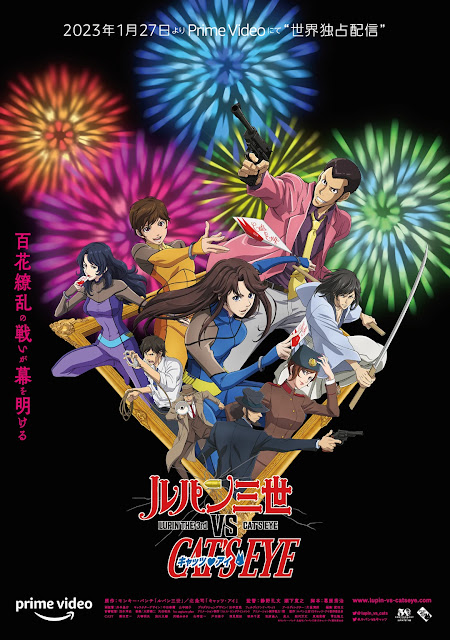PHENOMENALITY: *uncanny*
MYTHICITY: *fair*
FRYEAN MYTHOS: *comedy*
CAMPBELLIAN FUNCTION: *sociological*
I don't know how this criminal-crossover came to be produced, given that the second-billed franchise finished its runs both in manga and in anime in 1985. There were some revivals along the way, the latest stand-alone being a manga reboot from 2010-2014. It's possible that the re-release of the entire TV series on Blu-ray in 2022 was the proximate cause of the crossover. This suggests to me that the previous DVD release must have sold well, and that the Blu-ray release prompted the crossover, not, as some advertising had it, simply to celebrate CATSEYE's 40th anniversary.
In contrast, LUPIN III has remained a sturdy franchise for over fifty years, with a multitude of TV shows and movies in both animated and live-action incarnations. His top billing indicates his formidable seniority, but in terms of the script and the art-style of this cartoon film, the master thief and his aides Goemon and Jigen are for the most part reworked to fit the comparative "realism" of the CATSEYE world. Thus there are no scenes in which Lupin or his relentless police pursuer Zenigata howl or gesticulate wildly as one might see in Classic LUPIN. There are just enough comic reversals to still call it a comedy, though the only standout slapstick takes place early on, during a boat-chase that leaves Zenigata playing the goat as usual.
The slender premise of CATSEYE is that three sisters-- in descending age-order, Rui, Hitomi, and Ai-- become a gang professional art thieves known as "Catseye," and they constantly taunt the police with their many successful raids, just as Lupin taunts his opponents. The girls' father, who's alive but vaguely out of the picture for "reasons," was an art collector whose collection was dispersed during World War Two, and now "the Cats" travel around stealing back the possessions of their father. Whatever resolution the anime may have ended with, all the events of the crossover take place with this status quo premise in place. Like Lupin III, the Cats are pursued by a determined policeman, but in the case of the character Toshio, he's less dangerous in terms of actually catching the lady burglars than of catching sight of them. Toshio knows all three women in their civilian identities as managers of a Japanese cafe, and is more than a little smitten with middle girl Hitomi. Despite the danger of being recognized, the babes just can't bear to cover up their lovely visages and so perform all their crimes maskless.
In a routine so old that its whiskers have whiskers, the Cats are approached by an individual, one Berger, who claims to have been a colleague of their father, whom none of them can reach currently. Berger tells them that their father wanted them to have three interrelated paintings, but that the fiendish thief Lupin is out to get them first. Of course it's a lie; not only is Lupin a gentleman thief, he's the one who was actually a colleague of Dear Papa, and in most of his interactions with the sexy young things, the usually lascivious Lupin is positively avuncular. (His sort-of romantic interest Fujiko makes a few appearances in her usual status as ambivalent ally, but even here there are no boob-gropings or clothes-sheddings.)
The overall plot to use the paintings to find Nazi treasure is serviceable but forgettable, as are the villains. Though there's a mention of gems that may or may not be able to grant wishes, all the phenomena here are uncanny, concentrated in Goemon's amazing samurai-abilities or the athletic Cats' ability to throw metal cards like shuriken. LUPIN III VS. CATSEYE is a good basic romp but nothing special except for the event of crossing over the two franchises. (For good measure, another Japanese character, City Hunter, appears in a very brief cameo.)




No comments:
Post a Comment